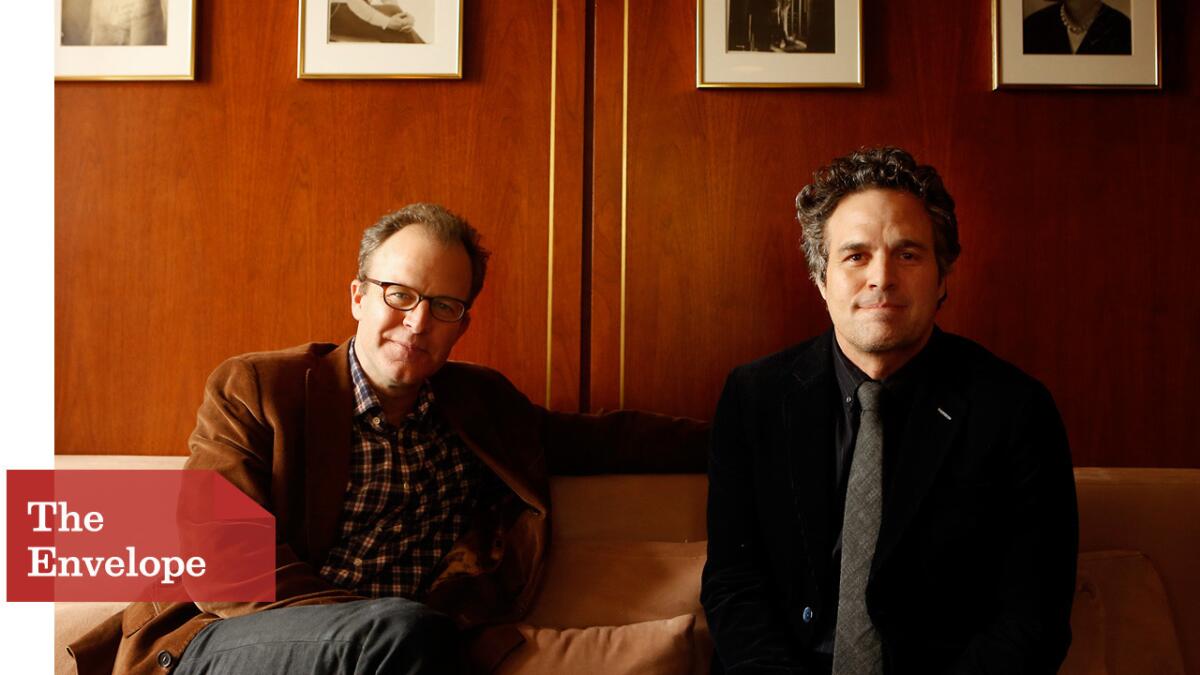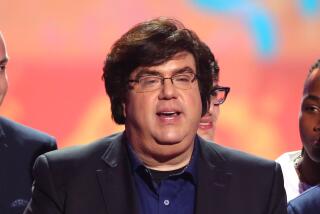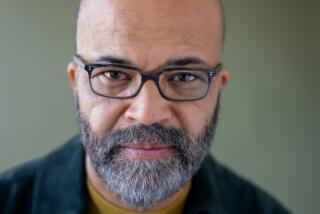The Envelope: ‘Spotlight’s’ makers went for ‘simple, unvarnished truth,’ not sensationalism

“Spotlight” actor Mark Ruffalo, right, and director Tom McCarthy (also a co-writer).
No car chases. No fistfights. Not even an illicit affair. The makers of “Spotlight” stuck to the facts, believing the unvarnished story of Boston Globe reporters uncovering the sexual abuse of children within the Catholic Church would be compelling enough.
“In many ways, the film is a study of craft, and that craft is professional journalism,” says Oscar-nominated director and co-writer Tom McCarthy. “We just took our inspiration from the actual reporting. We weren’t trying to, um …”
“Sex it up,” offers Oscar-nominated costar Mark Ruffalo, sitting beside his director in a booth before the bar opens at the Sunset Tower Hotel.
“Yeah, or to sensationalize it in any way to make it any more entertaining,” McCarthy says. “We thought, there’s enough ‘entertainment’ value in the story, in the subject matter. And the importance of the story.
“We had to be really patient and trust the audience to come to us, to come to the material. That was probably the big gamble, that we had a really strong screenplay and an incredible ensemble of actors we knew would bring a lot of humanity to this.”
The bet paid off, as the film has collected laurels across the board, including the top Screen Actors Guild Award for its stellar ensemble work. It is now among the front-runners for the best picture Oscar and is reverberating outside of Hollywood as well: Just last week the film screened for a Vatican commission on clerical sex abuse.
Despite the compelling nature of its David-versus-Goliath portrayal of “blue-collar” journalists, as Ruffalo describes them, up against the Church in the Catholic stronghold of Boston, the filmmakers still received notes about how to “improve” the film. For instance, although the characters are real people, one suggestion had been for Ruffalo’s Mike Rezendes and fellow nominee Rachel McAdams’ Sacha Pfeiffer to have an affair.
Hearing this, apparently for the first time, an incredulous Ruffalo turns to his director, “Are you joking?”
“We had a lot of those,” says McCarthy, confirming the unheeded advice. “We had ones that said, ‘Can you make the Church a more active antagonist?’ It made the challenge a little more high-wire in that regard, trying to find that pressure and tension without an evil priest running around knocking reporters off, you know? But again, I just kept leaning on the material.”
Oscars 2016: Full Coverage | Complete list | Top nominee photos | #OscarsSoWhite: The boycott, reaction and more
Both men trumpet the value of investigative journalism and agree on the seriousness of the actual reporters’ demeanor, again not exactly the stuff of box-office gold.
Ruffalo says his director “told us, these guys have a really flat way of talking. They don’t use language the way you guys do.
“I spent a few days with [Rezendes], watching him work a really important story. All these young men were being killed at Bridgewater, this criminal state psychiatric home. He basically uncovered [the guards] were being so brutally rough with them. He changed the law, he changed that whole institution with three choice stories.
“It was inspiring, and at the same time, so workaday. There’s nothing glamorous about it; it’s just one step in front of the next, all the way up the mountain.”
The filmmakers have been praised, including by the real journalists being portrayed, for capturing the essence of reporting work, complete with its occasional drudgery.
“The closer you could stay to the truth, the simple, unvarnished truth, the less ability people who don’t want the story to get out in the world have of hurting it, keeping it from reaching the people,” says Ruffalo.
Indeed, the film’s depiction of an entrenched institution actively covering up and even enabling crimes against children has gone largely unchallenged.
“Because it can’t be,” says Ruffalo, defiantly. “I don’t know one person who sat in that audience and doesn’t feel the moral authority of that movie by the time it’s over, who can say, ‘That didn’t happen.’”
Ruffalo and McCarthy both say survivors of abuse have thanked them for the film, Ruffalo relating the words of one grateful female viewer: “‘When I came out, everyone called me a liar, called me a fraud. They said it never happened. So many people were afraid to come forward because they saw the way I was treated.’
“I’ve rarely had such a positive response to a movie, and so much outrage,” says the actor. “When people see that Cardinal Law [archbishop emeritus of Boston] basically went to the Vatican to live in a palace to end his career, they can’t believe it. The outrage is constant.”
McCarthy says, “A lot of us involved, that sense of injustice gets us going.
“I don’t like when people cut in traffic,” he says, then the laugh dies away. “So when something this horrific and tragic, especially when it happens to vulnerable children … there’s something about the mechanism involved that allowed this to happen for so long — it’s so unjust; it’s so unfair.
“The reporters felt when they were writing the stories, and we felt when we were making the movie, we thought, ‘We’ve got one shot to make this clear and make our imprint. And I hope we can get it right.’”
Get more entertainment news on Facebook
MORE:
Movies ‘Truth’ and ‘Spotlight’ reflect yesteryear journalism with hints at modern-day angst
Vatican panel kicks off meeting on sexual abuse by watching ‘Spotlight’
‘Spotlight’ named best of 2015 by the Los Angeles Film Critics Assn.
More to Read
From the Oscars to the Emmys.
Get the Envelope newsletter for exclusive awards season coverage, behind-the-scenes stories from the Envelope podcast and columnist Glenn Whipp’s must-read analysis.
You may occasionally receive promotional content from the Los Angeles Times.







